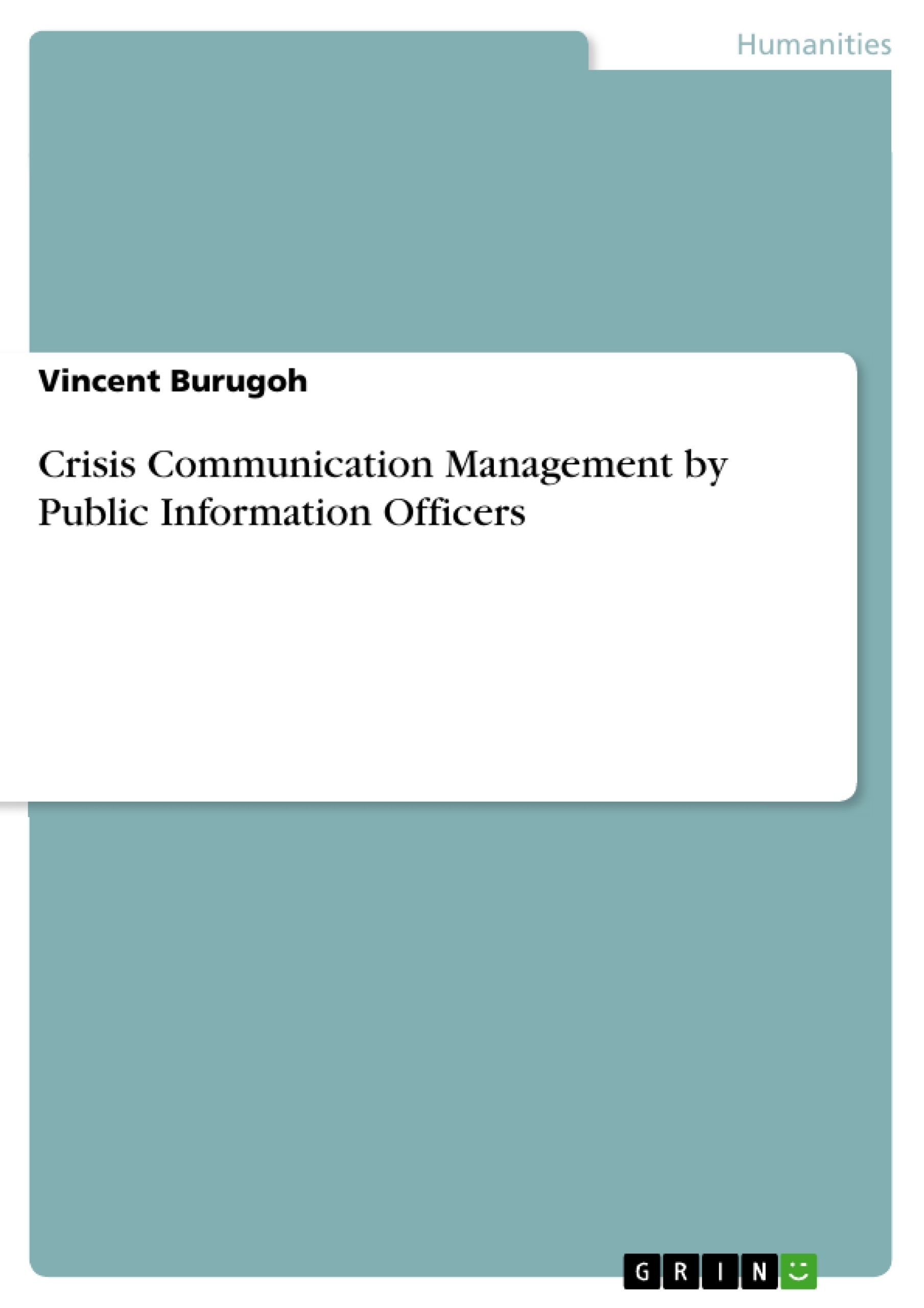The main aim of this research is to examine psychological effects experienced by the public information officers in their area of specialization. Numerous studies have been conducted in this area whit both the journalist and public information offices being asked questions related to the ugly scenes encountered ever while at work.
However, little is known about public information officers unlike journalists and first respondents whose area have been heavily researched on. Much is still needed to be known concerning their specific training and coping responses or available support programs to them.
Inhaltsverzeichnis (Table of Contents)
- CHAPTER 1.
- INTRODUCTION
- Study Significance.
- CHAPTER 2..
- THE COMMUNICATION PROCESS.
- The Exercise of Authority.
- Public Information Officers in Crisis Management Associate Areas and Activities.
- Objectives of the Research.
- CHAPTER 3.
- METHODOLOGY
- Participants.
- Measures
- CHAPTER 4:
- RESULTS
- Demographic Data.
- Work-Related traumatic Events Exposure.....
- Intensity Exposure.
- Avoidance and Intrusion Indicators...
- Intrusion Subset
- Avoidance subset.
- Coping Behaviors...
- CHAPTER 5
- DISCUSSION..
- Research Question 1.
- Research Question 2
- Limitations..
Zielsetzung und Themenschwerpunkte (Objectives and Key Themes)
This research aims to examine the psychological effects experienced by public information officers in their line of work. The study explores the impact of traumatic events encountered while carrying out their duties, especially the long-term effects on mental health. It also aims to identify the specific training, coping responses, and support programs available to public information officers in dealing with these challenges.
- Psychological effects of traumatic events on public information officers
- Communication challenges during crisis management
- Role of public information officers in crisis communication
- Training and coping mechanisms for public information officers
- Support programs for public information officers in crisis management
Zusammenfassung der Kapitel (Chapter Summaries)
Chapter 1 introduces the study's significance, highlighting the unique challenges faced by public information officers during crisis situations. It explores the potential for long-term psychological effects stemming from exposure to traumatic events. Chapter 2 delves into the communication process during crises, examining the complexities of information dissemination and the challenges of exercising authority in a chaotic environment. It analyzes the specific activities and areas where public information officers play a critical role in crisis management. Chapter 3 outlines the methodology employed in the research, including participant selection, data collection methods, and the measures used to assess the impact of traumatic events. Chapter 4 presents the findings of the research, analyzing the demographic data of participants and their experiences with work-related traumatic events. The chapter also explores the levels of exposure to trauma, the impact on mental health, and the coping mechanisms employed by public information officers. Chapter 5 discusses the implications of the findings, addressing the research questions and exploring the limitations of the study.
Schlüsselwörter (Keywords)
This research focuses on the intersection of crisis communication management, psychological trauma, and the role of public information officers. Key terms and concepts include crisis communication, media relations, public relations, stress disorder, avoidance, intrusion, mental health, and coping mechanisms. The study emphasizes the importance of understanding the psychological effects of traumatic events on public information officers and developing effective training and support programs to mitigate these challenges.
Frequently Asked Questions
What are the psychological effects of crisis management on PIOs?
Public Information Officers (PIOs) often experience stress, intrusion subset indicators (like recurring thoughts of traumatic events), and avoidance behaviors due to their exposure to crisis situations and traumatic scenes.
Why is research on PIOs less common than on journalists?
While journalists and first responders are frequently studied, PIOs are often overlooked. This research aims to fill that gap by examining their specific training needs and coping responses.
What role do PIOs play during a crisis?
PIOs are responsible for crisis communication, exercising authority in information dissemination, and managing media relations to ensure the public receives accurate information during chaotic events.
What are common coping mechanisms for PIOs?
The study explores various coping behaviors used by PIOs to manage work-related trauma, highlighting the need for formal support programs and specialized mental health training.
How does traumatic exposure intensity affect PIOs?
The research analyzes demographic data and the intensity of exposure to traumatic events, showing that repeated exposure can lead to long-term psychological challenges similar to those of first responders.
- Quote paper
- Vincent Burugoh (Author), 2017, Crisis Communication Management by Public Information Officers, Munich, GRIN Verlag, https://www.grin.com/document/381281



